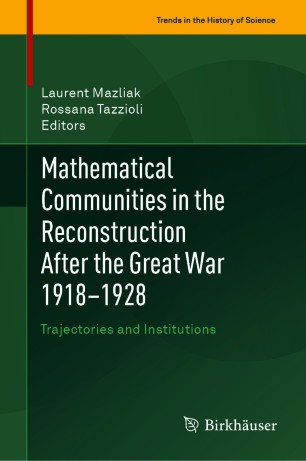Introduction
This book is a consequence of the international meeting organized in Marseilles in November 2018 devoted to the aftermath of the Great War for mathematical communities. It features selected original research presented at the meeting offering a new perspective on a period, the 1920s, not extensively considered by historiography.
After 1918, new countries were created, and borders of several others were modified. Territories were annexed while some countries lost entire regions. These territorial changes bear witness to the massive and varied upheavals with which European societies were confronted in the aftermath of the Great War. The reconfiguration of political Europe was accompanied by new alliances and a redistribution of trade – commercial, intellectual, artistic, military, and so on – which largely shaped international life during the interwar period. These changes also had an enormous impact on scientific life, not only in practice, but also in its organization and communication strategies.
The mathematical sciences, which from the late 19th century to the 1920s experienced a deep disciplinary evolution, were thus facing a double movement, internal and external, which led to a sustainable restructuring of research and teaching. Concomitantly, various areas such as topology, functional analysis, abstract algebra, logic or probability, among others, experienced exceptional development. This was accompanied by an explosion of new international or national associations of mathematicians with for instance the founding, in 1918, of the International Mathematical Union and the controversial creation of the International Research Council. Therefore, the central idea for the articulation of the various chapters of the book is to present case studies illustrating how in the aftermath of the war, many mathematicians had to organize their personal trajectories taking into account the evolution of the political, social and scientific environment which had taken place at the end of the conflict.
URL: https://link.springer.com/book/10.1007/978-3-030-61683-0#toc
Front Matter
Pages i-xvi
William Henry Young, an Unconventional President of the International Mathematical Union
Guillermo P. Curbera
Pages 1-29
The Unione Matematica Italiana and Its Bollettino, 1922–1928. National and International Aspects
Livia Giacardi, Rossana Tazzioli
Pages 31-61
L’Enseignement Mathématique and Its Internationalist Ambitions During the Turmoil of WWI and the 1920s
Hélène Gispert
Pages 63-88
Mathematics and Logic in Polish Encyclopedias Published During the Interwar Period
Roman Murawski
Pages 89-117
From the War Against Errors to Mathematics After the War: Public Discourses on a New Mathematical Dictionary
Laura E. Turner
Pages 119-150
International Geodesy in the Post-war Period, as Seen by the French Bureau des Longitudes (1917–1922)
Martina Schiavon
Pages 151-189
“The First Mathematically Serious German School of Applied Mathematics”?
Reinhard Siegmund-Schultze
Pages 191-225
The Mathematics of Nonlinear Oscillations in the 1920s: A Decade of Trials and Convergence? Examples of the Work of Nicolai Minorsky
Loïc Petitgirard
Pages 227-251
From Fundamenta Mathematicae to Studia Mathematica: The Renaissance of Polish mathematics in light of Banach’s publications 1919–1940
Frédéric Jaëck
Pages 253-276
Following Béla von Kerékjártó. The Journeys of a Hungarian Mathematician in the Post-war World
Alicia Filipiak
Pages 277-306
Under the Protection of Alien Wings. Russian Emigrant Mathematiciancs in Interwar France: A General Picture and Two Case Studies of Ervand Kogbetliantz and Vladimir Kosticyn
Laurent Mazliak, Thomas Perfettini
Pages 307-355
Back Matter
Pages 357-363

No comments:
Post a Comment